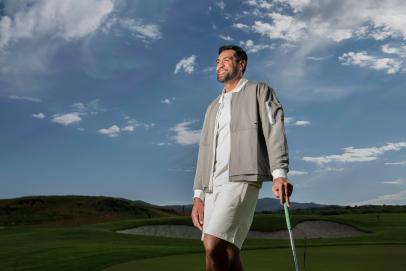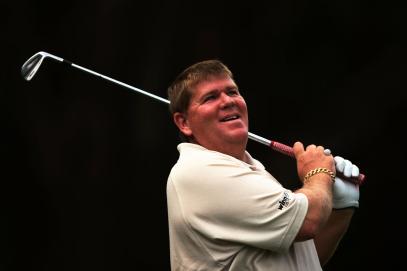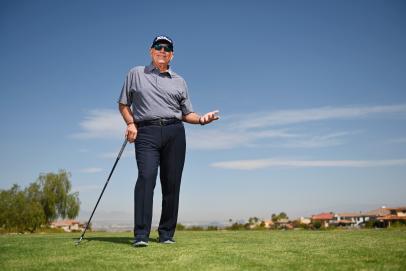Cover Story
How Tony Finau maintains his killer instinct (with a smile)

GOLF DIGEST RECENTLY SPENT TIME WITH TONY FINAU AT VICTORY RANCH, a swanky new residential development and golf course overlooking Park City, Utah. There we broke the news to him that he finished first on Golf Digest’s fourth edition of its Tour Nice Guys Ranking, and his reaction was wonderfully modest. On the range before he showed us a few shots, he took a fresh glove from its packaging and commented about how much this luxury still tickles him. This from a golfer who has cracked the top 10 in the world ranking, played on a victorious Ryder Cup team and won four times—after back-to-back wins at the 3M Open and the Rocket Mortgage Classic—on the PGA Tour. Just an hour west of Park City, beyond the beautiful mountains, Milton Pouha (Tony) Finau grew up the third of seven children in a gritty section of Salt Lake City to a father, Kelepi, who worked night shifts for Delta Airlines, and mother, Ravena. There Tony lapped the Jordan River Par 3 Course wearing the same glove for five years, playing with younger brother Gipper.
That’s not to suggest simple origins are a requisite for being nice. For sure, lots of wealthy country-club tour players are as quick with a warm greeting and a handshake when the cameras aren’t watching. But Finau’s easygoing manner made him top of mind among his peers. Of course, “nice” is subjective. Particularly this year, the ongoing schism in professional golf has challenged traditional notions about right and wrong. It’s possible to be an ethically upright person who isn’t pleasant to strangers, just as it is to be a cordial backstabber to one’s friends. Hanging out with Finau, 32, though, confirmed that our method picked a good egg. (This interview has been edited for concision.)
●●●
We just put you through three hours of poses and video in front of camera lights on a hot day. Most tour pros would be at least a little irritated right now. No worries, man. I’m about to go play some golf this afternoon, so life is all good.
●●●
All humility aside, why do you think you finished first in our voting of Tour Nice Guys? I’m very humbled by it, so I don’t know if it’s possible to put humility aside. I suppose the apple doesn’t fall far from the tree. My parents were amazing people, very approachable, God-fearing, who did a great job of raising me. Treat people the way you want to be treated. That has stuck with me since I was a kid.
●●●
When you were a kid, what were you like to play with in junior competitions? Ask questions early and get to know your playing partners or wait to feel them out? I was really shy. I was a lot bigger than most of the kids, and my attire was different. My brother Gipper and I learned the game from our dad who didn’t play golf, so we were a bit out of our element. But once I got to know some of the kids, I became more comfortable. Some of my best friends on tour I’ve played against since I was 8 years old, like Zac Blair and Scott Pinckney. Rory McIlroy stayed with the Pinckneys for two straight summers, so I got to know him pretty well, too.
●●●
You turned pro at 17 and lived many, call it seven, hard years getting to the PGA Tour. Were you always a nice guy during this journey? It’s so hard to talk about myself. I’ve made a point to stay hungry and humble. I’ll never forget how stressful and nervous it was making nothing on the mini-tours while having children, but I had so much help from my parents, my wife Alayna, and others. There’s an incredible team of people around me now. Although my life has changed dramatically, I believe I’m the same person. I believe in gratitude and that having gratitude is the easiest way to snap yourself out of any kind of funk. High school is my highest level of education, so I’ve leaned on books to help me along the way.
●●●
What books? I read almost exclusively self-help books. The Slight Edge by Jeff Olson really resonated with me. I never thought of myself as a great golfer, but little by little our habits aggregate over time. How Will You Measure Your Life? by Clay Christensen is about the importance of family and how we too often neglect them for our careers. I think it’s possible to have both. My wife’s family and our family—we all live within 20 miles of one another.
●●●
But golf is a self-centered game. To prepare requires oodles of concentration on the self—how you practice, how you eat, how you sleep—that the people in a golfer’s life must inevitably and often come second. “Be where your feet are” is something my dad always told me. So when I’m with my family, I try to be fully present. Don’t bring the golf course home and vice versa. When I’m at the course, I’m all business. It’s easier said than done, but this wisdom has helped me adapt to being a husband and a father.
●●●
When you walk in the door, does Alayna ask how you played? She’s usually the first one to text me during tournaments, so she knows. But on practice days, I won’t mention golf unless I’ve done something really cool like make a hole-in-one or shoot a 59. I’ve been gone for multiple hours, so my first question is What does she want? When you’re a family man, you try to be selfless because that’s what it’s about.

Finau poses with his wife, Alayna, and their five children after his victory at the 3M Open in July.
Stacy Revere
●●●
You were a good basketball player, and your dad was good at pretty much everything. Can you be a killer and a nice guy in sports? Absolutely. Take Steph Curry. He’s the nicest dude there is, and on the court he’s a killer, runs circles around people. I believe I have that mode, too. It’s like I told my son Jraice, who’s 10 and getting into competitive golf and doing well. I said, “Figure out how you play best. Is it a mental state of being happy, determined, angry, and if so what level of anger?” I have no issue telling a guy “nice shot” because saying those words doesn’t affect me. I actually like seeing quality shots because it gives me good mojo. Doesn’t mean I want to see the guy make 18 eagles. I want to win. You have to be selfish when it comes to winning because you have a short window to do it.
●●●
How did that conversation with your son conclude? I wanted him to know he doesn’t need to be like me on the course, mellow and even-keeled. Over time I’ve learned that I play worse if I’m amped and thinking too much. Jraice is naturally more intense than I am, which is fine, but to get into the flow of his rounds he probably needs to start a few notches lower on the first tee.
●●●
What are some things other players on tour could do to be nicer? There could be more patience shown toward volunteers. They tend to be retired folks who maybe move a little slower. There are thousands of fans around; it can be chaotic, so let’s not get mad at a volunteer standing in the wrong place or who doesn’t immediately find your ball in the rough. You shouldn’t have hit it there anyway. They’re not stepping on your ball, even though you might be giving him or her a reason to.
●●●
We have to talk about the LIV Tour. What have you been offered and how did it all transpire? I probably shouldn’t go into specifics. There are so many layers to this. The temperature in the golfing world has been extremely hot. It’s changed the landscape of our game, and I don’t believe it’s been for the good. Competition is healthy, and so it’s not terrible that it’s forced the PGA Tour to re-examine some of its operations. I’ve always been a believer in working inward, not looking outward to a source for help. I’ve been shocked by how many guys jumped ship to LIV. I understand the monetary gain can be hard to resist, but I’ve always been grateful to be a PGA Tour member. I remember how hard I fought to become one. As a kid, I never dreamt about making $100 million. I dreamt about making a putt that meant everything.
●●●
Has there been a person whose opinion you’ve valued most trying to understand this situation? Alayna is always going to be the biggest influence on me. She runs the family, so when she talks, I’m all ears. My manager Chris [Armstrong] knows more about the ins and outs. I value his opinion. Together we’ve discussed the morality aspect, which I think should be at the forefront of the decision for most people. The term “blood money” has been thrown around, although I think that’s harsh. In a global economy, I’m not sure how deep we should look at the root of money in most organizations. The question to answer is, What are you loyal to? I’m loyal to my family first. If you’re loyal to history and trophies, then the PGA Tour is a good place for you. For guys in their 40s, they see a golden ticket into the sunset. No cuts, limited field events—tough to blame a guy for making what he thinks is the best decision for himself. Selfishly, I just want to play against all the best players in the world in one place.
●●●
What advice would you give a top golfer coming out of college? The kids coming out are smart enough to understand that if they choose not to play the PGA Tour, there’s going to be consequences, and they’re going to be looked at in a certain light. Do what’s best for who you are and what you want to become, knowing you’re going to have to live with that decision. To me, they are two very different choices.
●●●
We noticed some Twitter activity from your handle after the school shooting in Uvalde, Texas. Where were you when you first heard the news, and how did it affect you?
I was playing a practice round at Colonial. It pierced me to my very being. As a father, I can’t imagine what those parents are going through, to be victims of such a devastating act of violence. I was shaken for weeks. I feel goosebumps thinking about it again now. As a country, we have to figure out how to prevent this from happening as often. Conservative or liberal, we all agree this is a terrible act. How do we change people’s hearts? I believe in prayer, but I also believe in action. Maybe I don’t know enough about the laws, but I’m trying to help kids with my foundation. These children are the strongest generation that’s ever been born, and it’s our responsibility to create a safe world for them to grow up in.
●●●
It’s refreshing to hear such optimism. When people categorize generations lately, more often there is focus on the faults and shortcomings. There are a couple of elementary and middle schools in my hometown I visit often. We do Tony’s Turkeys during Thanksgiving, feeding families, and I’m surrounded by loving kids who want to help. They’ve come up in a world of chaos, yet they are smarter and more resilient than we were. As much as I’ve tried to parent my kids, I’m recognizing they naturally are who they are. It’s crazy to think these kids are just kids. Our future is in good hands thanks to them, not us.
●●●
Thich Nhat Hanh, a Vietnamese Buddhist who died this year at 95, wrote, “Walk as if your feet are kissing the Earth.” That strikes me as the way you carry yourself. Does that ring true, and is there a phrase that you’ve lived by? Wow, I love that. I’ve never heard that. It’s not really a phrase, but there is a word that sums up how I want to live and that’s “charity.” Broadly, it just means helping somebody else. In all the current dialogue about mental health, people talk about taking care of themselves first before helping others, but I believe the opposite to be true. My mom [Ravena, who died in a car accident in 2011] and dad remain among the most contented humans I’ve ever known, and their entire lives were service to me, my siblings and our community. If I have a conversation with a person, and I leave thinking I’ve brightened their day just a little bit somehow, that makes me happy. I say this with full honesty, but my family and foundation have given me more joy than any selfish desire to be great at golf. When I dream about winning, say, the Open Championship, I think about the 7-year-old in Thailand watching me who gets inspired to play and win the Open. If your desire is to serve somebody else, the joy that comes back is more than anything else can give you.
●●●
Thank you for that. That went so well I’ll throw another random quote. The writer Hunter S. Thompson quipped, “Having a favorite baseball team is like having a favorite oil company.” As we get used to the prospect of regular team golf, does that statement ring truer now? Ha, not yet. But maybe someday not too soon.


